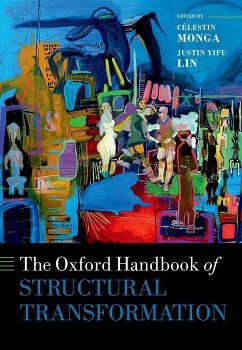The Oxford Handbook of Structural Transformation
Herausgeber: Monga, Célestin; Yifu Lin, Justin
The Oxford Handbook of Structural Transformation
Herausgeber: Monga, Célestin; Yifu Lin, Justin
- Gebundenes Buch
- Merkliste
- Auf die Merkliste
- Bewerten Bewerten
- Teilen
- Produkt teilen
- Produkterinnerung
- Produkterinnerung
This Oxford Handbook provides a critical assessment of the history, patterns, and strategies of economic transformation. It deals with major themes including policy issues, illuminating country experiences, and important debates on the respective roles of the market and the state.
Andere Kunden interessierten sich auch für
![The Oxford Handbook of Organizational Change and Innovation The Oxford Handbook of Organizational Change and Innovation]() The Oxford Handbook of Organizational Change and Innovation263,99 €
The Oxford Handbook of Organizational Change and Innovation263,99 €![The Oxford Handbook of Productivity Analysis The Oxford Handbook of Productivity Analysis]() The Oxford Handbook of Productivity Analysis225,99 €
The Oxford Handbook of Productivity Analysis225,99 €![The Concise Oxford History of Indian Business The Concise Oxford History of Indian Business]() Dwijendra TripathiThe Concise Oxford History of Indian Business29,99 €
Dwijendra TripathiThe Concise Oxford History of Indian Business29,99 €![The Oxford Handbook of Organizational Well-Being The Oxford Handbook of Organizational Well-Being]() The Oxford Handbook of Organizational Well-Being245,99 €
The Oxford Handbook of Organizational Well-Being245,99 €![The Oxford Handbook of Supply Chain Management The Oxford Handbook of Supply Chain Management]() The Oxford Handbook of Supply Chain Management256,99 €
The Oxford Handbook of Supply Chain Management256,99 €![The Oxford Handbook of Contextual Approaches to Human Resource Management The Oxford Handbook of Contextual Approaches to Human Resource Management]() The Oxford Handbook of Contextual Approaches to Human Resource Management242,99 €
The Oxford Handbook of Contextual Approaches to Human Resource Management242,99 €![Oxford Handbook of the Learning Organization Oxford Handbook of the Learning Organization]() Oxford Handbook of the Learning Organization211,99 €
Oxford Handbook of the Learning Organization211,99 €-
-
-
This Oxford Handbook provides a critical assessment of the history, patterns, and strategies of economic transformation. It deals with major themes including policy issues, illuminating country experiences, and important debates on the respective roles of the market and the state.
Hinweis: Dieser Artikel kann nur an eine deutsche Lieferadresse ausgeliefert werden.
Hinweis: Dieser Artikel kann nur an eine deutsche Lieferadresse ausgeliefert werden.
Produktdetails
- Produktdetails
- Verlag: Hurst & Co.
- Seitenzahl: 742
- Erscheinungstermin: 14. April 2019
- Englisch
- Abmessung: 251mm x 177mm x 53mm
- Gewicht: 1476g
- ISBN-13: 9780198793847
- ISBN-10: 0198793847
- Artikelnr.: 53775329
- Herstellerkennzeichnung
- Libri GmbH
- Europaallee 1
- 36244 Bad Hersfeld
- 06621 890
- Verlag: Hurst & Co.
- Seitenzahl: 742
- Erscheinungstermin: 14. April 2019
- Englisch
- Abmessung: 251mm x 177mm x 53mm
- Gewicht: 1476g
- ISBN-13: 9780198793847
- ISBN-10: 0198793847
- Artikelnr.: 53775329
- Herstellerkennzeichnung
- Libri GmbH
- Europaallee 1
- 36244 Bad Hersfeld
- 06621 890
Dr. Célestin Monga is Vice-President, Economic Governance and Knowledge Management at the African Development Bank Group. He also teaches economics at the University of Paris 1 Panthéon-Sorbonne, France, and Peking University, China. He has held various board and senior executive positions in academia, financial services, and international development institutions, serving most recently as Managing Director at the United Nations Industrial Development Organization (UNIDO), and Senior Economic Adviser-Director at the World Bank. Dr. Monga has published extensively on various dimensions of economic and political development. His books have been translated into several languages and are widely used as teaching tools in academic institutions around the world. Professor Justin Yifu Lin, former Senior Vice-President and Chief Economist of the World Bank, is Dean of the Institute for New Structural Economics and the Institute of South-South Cooperation and Development, and Honorary Dean at the National School of Development, Peking University. He is a member of the Standing Committee, Chinese People's Political Consultation Conference, and Vice Chairman of the All-China Federation of Industry and Commerce. He is a Corresponding Fellow of the British Academy and a Fellow of the Academy of Sciences for Developing World.
* Introduction: Overcoming the Curse of Destiny
* Section I: Theories and Frameworks of Structural Change
* 1: Joseph E. Stiglitz: Structural Transformation, Deep Downturns, and
Government Policy
* 2: Roger Rogerson: Structural Transformation and Growth: Theoretical
Considerations,
* 3: Justin Yifu Lin and Yong Wang: Remodeling Structural Change
* 4: Ravi Kanbur: Structural Transformation and Income Distribution:
Kuznets and Beyond
* 5: Terutomo Ozawa: The Flying Geese Theory: A Reassessment
* 6: C. Peter Timmer: Changing Income Inequality during Structural
Transformation: The Role of Agricultural Prices
* 7: Christian Ketels: Structural Transformation: A
Competitiveness-Based View
* Section II: Drivers, Channels, and Policy Instruments
* 8: Giovanni Federico: Trade and Structural Change over Two Centuries
* 9: Enisse Kharroubi and Luiz A. Pereira da Silva: Financial Reforms,
Financial Development and Structural Change
* 10: Laura Alfaro and Maggie Xiaoyang Chen: Location Fundamentals,
Agglomeration Economies, and the Geography of Multinational Firms
* 11: Pauline Lectard: Sustainable Structural Change in the Context of
Global Value Chains
* 12: Xubei Luo and Gary Gereffi: Participation in Global Value Chains:
Challenges and Opportunities
* 13: Xiaobo Zhang: Building Effective Clusters and Industrial Parks
* 14: Kevin Lu and Cledan Mandri-Perrott: Infrastructure Finance:
Mobilizing Long-Term Liability Embedded Funds from International
Institutional Investors to Emerging Markets
* Section III: Empirics of Structural Change
* 15: Célestin Monga and Samuel Standaert: Measuring Structural Change
* 16: Phillip Pardey and Julian M. Alston: Transforming Traditional
Agriculture Redux
* 17: Nobuya Haraguchi: Manufacturing and Employment in Large Countries
* 18: Kalpana Kochhar, Sonali Jain-Chandra, and Monique Newiak: Global
Megatrends and the Macroeconomics of Gender
* Section IV: Country and Regional Experiences
* 19: Jose Antonio Ocampo: The Transformation of Latin American
Economies
* 20: Deepak Nayyar: India's Path to Transformation: An Exception to
the Rule
* 21: Khalid Ikram: Structural Transformation in Egypt, 1965-2015
* 22: Dang Thi Thu Hoai, Finn Tarp, and Dirk van Seventer: Growth and
Structural Transformation in Viet Nam: The Real Story Beneath
* 23: Barry Naughton: Economic Reform and Structural Change: The
Chinese Experience
* 24: Keun Lee: Financing Industrial Development in Korea and
Implications for Africa
* 25: Wan-wen Chu: How Taiwan Managed to Grow: Structural
Transformation and Industrial Policy
* 26: Arkebe Oqubay: Ethiopia: Lessons from an Experiment
* 27: Xinshen Diao, Josaphat Kweka, and Margaret McMillan: Economic
Transformation in Africa from the Bottom Up: New Evidence from
Tanzania
* 28: Tchétché Nguessan: Growth and Structural Transformation in the
WAEMU Countries
* Section V: Concluding Thoughts
* 29: Célestin Monga: Truth is the Safest Lie: A Reassessment of
Development Economics
* 30: Roger Myerson: American Democracy: Lessons for Global Development
* 31: Edmund Phelps: Desirable Directions of Structural Transformation
* Section I: Theories and Frameworks of Structural Change
* 1: Joseph E. Stiglitz: Structural Transformation, Deep Downturns, and
Government Policy
* 2: Roger Rogerson: Structural Transformation and Growth: Theoretical
Considerations,
* 3: Justin Yifu Lin and Yong Wang: Remodeling Structural Change
* 4: Ravi Kanbur: Structural Transformation and Income Distribution:
Kuznets and Beyond
* 5: Terutomo Ozawa: The Flying Geese Theory: A Reassessment
* 6: C. Peter Timmer: Changing Income Inequality during Structural
Transformation: The Role of Agricultural Prices
* 7: Christian Ketels: Structural Transformation: A
Competitiveness-Based View
* Section II: Drivers, Channels, and Policy Instruments
* 8: Giovanni Federico: Trade and Structural Change over Two Centuries
* 9: Enisse Kharroubi and Luiz A. Pereira da Silva: Financial Reforms,
Financial Development and Structural Change
* 10: Laura Alfaro and Maggie Xiaoyang Chen: Location Fundamentals,
Agglomeration Economies, and the Geography of Multinational Firms
* 11: Pauline Lectard: Sustainable Structural Change in the Context of
Global Value Chains
* 12: Xubei Luo and Gary Gereffi: Participation in Global Value Chains:
Challenges and Opportunities
* 13: Xiaobo Zhang: Building Effective Clusters and Industrial Parks
* 14: Kevin Lu and Cledan Mandri-Perrott: Infrastructure Finance:
Mobilizing Long-Term Liability Embedded Funds from International
Institutional Investors to Emerging Markets
* Section III: Empirics of Structural Change
* 15: Célestin Monga and Samuel Standaert: Measuring Structural Change
* 16: Phillip Pardey and Julian M. Alston: Transforming Traditional
Agriculture Redux
* 17: Nobuya Haraguchi: Manufacturing and Employment in Large Countries
* 18: Kalpana Kochhar, Sonali Jain-Chandra, and Monique Newiak: Global
Megatrends and the Macroeconomics of Gender
* Section IV: Country and Regional Experiences
* 19: Jose Antonio Ocampo: The Transformation of Latin American
Economies
* 20: Deepak Nayyar: India's Path to Transformation: An Exception to
the Rule
* 21: Khalid Ikram: Structural Transformation in Egypt, 1965-2015
* 22: Dang Thi Thu Hoai, Finn Tarp, and Dirk van Seventer: Growth and
Structural Transformation in Viet Nam: The Real Story Beneath
* 23: Barry Naughton: Economic Reform and Structural Change: The
Chinese Experience
* 24: Keun Lee: Financing Industrial Development in Korea and
Implications for Africa
* 25: Wan-wen Chu: How Taiwan Managed to Grow: Structural
Transformation and Industrial Policy
* 26: Arkebe Oqubay: Ethiopia: Lessons from an Experiment
* 27: Xinshen Diao, Josaphat Kweka, and Margaret McMillan: Economic
Transformation in Africa from the Bottom Up: New Evidence from
Tanzania
* 28: Tchétché Nguessan: Growth and Structural Transformation in the
WAEMU Countries
* Section V: Concluding Thoughts
* 29: Célestin Monga: Truth is the Safest Lie: A Reassessment of
Development Economics
* 30: Roger Myerson: American Democracy: Lessons for Global Development
* 31: Edmund Phelps: Desirable Directions of Structural Transformation
* Introduction: Overcoming the Curse of Destiny
* Section I: Theories and Frameworks of Structural Change
* 1: Joseph E. Stiglitz: Structural Transformation, Deep Downturns, and
Government Policy
* 2: Roger Rogerson: Structural Transformation and Growth: Theoretical
Considerations,
* 3: Justin Yifu Lin and Yong Wang: Remodeling Structural Change
* 4: Ravi Kanbur: Structural Transformation and Income Distribution:
Kuznets and Beyond
* 5: Terutomo Ozawa: The Flying Geese Theory: A Reassessment
* 6: C. Peter Timmer: Changing Income Inequality during Structural
Transformation: The Role of Agricultural Prices
* 7: Christian Ketels: Structural Transformation: A
Competitiveness-Based View
* Section II: Drivers, Channels, and Policy Instruments
* 8: Giovanni Federico: Trade and Structural Change over Two Centuries
* 9: Enisse Kharroubi and Luiz A. Pereira da Silva: Financial Reforms,
Financial Development and Structural Change
* 10: Laura Alfaro and Maggie Xiaoyang Chen: Location Fundamentals,
Agglomeration Economies, and the Geography of Multinational Firms
* 11: Pauline Lectard: Sustainable Structural Change in the Context of
Global Value Chains
* 12: Xubei Luo and Gary Gereffi: Participation in Global Value Chains:
Challenges and Opportunities
* 13: Xiaobo Zhang: Building Effective Clusters and Industrial Parks
* 14: Kevin Lu and Cledan Mandri-Perrott: Infrastructure Finance:
Mobilizing Long-Term Liability Embedded Funds from International
Institutional Investors to Emerging Markets
* Section III: Empirics of Structural Change
* 15: Célestin Monga and Samuel Standaert: Measuring Structural Change
* 16: Phillip Pardey and Julian M. Alston: Transforming Traditional
Agriculture Redux
* 17: Nobuya Haraguchi: Manufacturing and Employment in Large Countries
* 18: Kalpana Kochhar, Sonali Jain-Chandra, and Monique Newiak: Global
Megatrends and the Macroeconomics of Gender
* Section IV: Country and Regional Experiences
* 19: Jose Antonio Ocampo: The Transformation of Latin American
Economies
* 20: Deepak Nayyar: India's Path to Transformation: An Exception to
the Rule
* 21: Khalid Ikram: Structural Transformation in Egypt, 1965-2015
* 22: Dang Thi Thu Hoai, Finn Tarp, and Dirk van Seventer: Growth and
Structural Transformation in Viet Nam: The Real Story Beneath
* 23: Barry Naughton: Economic Reform and Structural Change: The
Chinese Experience
* 24: Keun Lee: Financing Industrial Development in Korea and
Implications for Africa
* 25: Wan-wen Chu: How Taiwan Managed to Grow: Structural
Transformation and Industrial Policy
* 26: Arkebe Oqubay: Ethiopia: Lessons from an Experiment
* 27: Xinshen Diao, Josaphat Kweka, and Margaret McMillan: Economic
Transformation in Africa from the Bottom Up: New Evidence from
Tanzania
* 28: Tchétché Nguessan: Growth and Structural Transformation in the
WAEMU Countries
* Section V: Concluding Thoughts
* 29: Célestin Monga: Truth is the Safest Lie: A Reassessment of
Development Economics
* 30: Roger Myerson: American Democracy: Lessons for Global Development
* 31: Edmund Phelps: Desirable Directions of Structural Transformation
* Section I: Theories and Frameworks of Structural Change
* 1: Joseph E. Stiglitz: Structural Transformation, Deep Downturns, and
Government Policy
* 2: Roger Rogerson: Structural Transformation and Growth: Theoretical
Considerations,
* 3: Justin Yifu Lin and Yong Wang: Remodeling Structural Change
* 4: Ravi Kanbur: Structural Transformation and Income Distribution:
Kuznets and Beyond
* 5: Terutomo Ozawa: The Flying Geese Theory: A Reassessment
* 6: C. Peter Timmer: Changing Income Inequality during Structural
Transformation: The Role of Agricultural Prices
* 7: Christian Ketels: Structural Transformation: A
Competitiveness-Based View
* Section II: Drivers, Channels, and Policy Instruments
* 8: Giovanni Federico: Trade and Structural Change over Two Centuries
* 9: Enisse Kharroubi and Luiz A. Pereira da Silva: Financial Reforms,
Financial Development and Structural Change
* 10: Laura Alfaro and Maggie Xiaoyang Chen: Location Fundamentals,
Agglomeration Economies, and the Geography of Multinational Firms
* 11: Pauline Lectard: Sustainable Structural Change in the Context of
Global Value Chains
* 12: Xubei Luo and Gary Gereffi: Participation in Global Value Chains:
Challenges and Opportunities
* 13: Xiaobo Zhang: Building Effective Clusters and Industrial Parks
* 14: Kevin Lu and Cledan Mandri-Perrott: Infrastructure Finance:
Mobilizing Long-Term Liability Embedded Funds from International
Institutional Investors to Emerging Markets
* Section III: Empirics of Structural Change
* 15: Célestin Monga and Samuel Standaert: Measuring Structural Change
* 16: Phillip Pardey and Julian M. Alston: Transforming Traditional
Agriculture Redux
* 17: Nobuya Haraguchi: Manufacturing and Employment in Large Countries
* 18: Kalpana Kochhar, Sonali Jain-Chandra, and Monique Newiak: Global
Megatrends and the Macroeconomics of Gender
* Section IV: Country and Regional Experiences
* 19: Jose Antonio Ocampo: The Transformation of Latin American
Economies
* 20: Deepak Nayyar: India's Path to Transformation: An Exception to
the Rule
* 21: Khalid Ikram: Structural Transformation in Egypt, 1965-2015
* 22: Dang Thi Thu Hoai, Finn Tarp, and Dirk van Seventer: Growth and
Structural Transformation in Viet Nam: The Real Story Beneath
* 23: Barry Naughton: Economic Reform and Structural Change: The
Chinese Experience
* 24: Keun Lee: Financing Industrial Development in Korea and
Implications for Africa
* 25: Wan-wen Chu: How Taiwan Managed to Grow: Structural
Transformation and Industrial Policy
* 26: Arkebe Oqubay: Ethiopia: Lessons from an Experiment
* 27: Xinshen Diao, Josaphat Kweka, and Margaret McMillan: Economic
Transformation in Africa from the Bottom Up: New Evidence from
Tanzania
* 28: Tchétché Nguessan: Growth and Structural Transformation in the
WAEMU Countries
* Section V: Concluding Thoughts
* 29: Célestin Monga: Truth is the Safest Lie: A Reassessment of
Development Economics
* 30: Roger Myerson: American Democracy: Lessons for Global Development
* 31: Edmund Phelps: Desirable Directions of Structural Transformation








